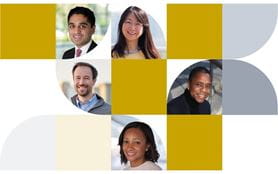Alumni profile: Lai Lai Wong discusses the art of making a difference
Headlines in this article
Related news and insights
Publications: 11 December 2023
Publications: 11 December 2023
Publications: 11 December 2023
Publications: 11 December 2023
Responsible AI: navigating the risks and embracing the possibilities
When you have been immersed from an early age in different languages and cultures, diversity is the norm. Now alumna Lai Lai Wong is putting that experience to good use.

Lai Lai Wong is no stranger to change. Born in China, educated in Macau, Portugal and Edinburgh, this London based mother of two, former A&O senior associate and current Peerpoint consultant, has seized opportunities as they came along and revelled in the results.
That was how she first discovered law and A&O, and more recently how she found ways to harness her experience as a lawyer in the education system and the cultural arena.
Lai Lai had left A&O to join Peerpoint, A&O’s legal consulting platform in 2017, when a move back to Asia looked imminent and stayed with Peerpoint when her family’s relocation was put on hold. Her second assignment was coming to an end when Covid-19 brought down the shutters on the global economy.
In lockdown, dealing with the same challenges as many others, she saw sectors of society that were in desperate need as a result of the pandemic. “I realised I had to refocus my energy to help,” she said. Fortuitously, she was in a position to do so.
Through the A&O network, she had become a governor at Halley Primary School in 2018. It’s a small school, located in Tower Hamlets, one of the poorest London boroughs. “The challenges facing the school were overwhelming,” she said, “especially following the outbreak of the pandemic and school closures.” Getting children access to online learning was one; making sure free meal vouchers got to the families entitled to them was another.
It is critical now, more than ever, that we foster a greater understanding and appreciation of different cultures and races.
Law or art?
It might have been so different, had she decided on a different career when she was weighing her options. A year out of university, Lai Lai was torn between law and art school which, coming from a family of sculptors, seemed more logical. She had friends at A&O and liked what she heard about the firm, but her degree was in psychology and business, so she would need to do a conversion course.
Her father’s advice helped her decide. “Dad gave me insight into art,” she said. “He told me so many incredibly talented and hardworking people would not make it as an artist.” Law, he felt, would offer someone with her skills more opportunities.
And so it proved correct. She may have been “lucky to get a training contract”, as she put it, but it was her work ethic that helped her make the most of it.
“It was hard,” she recalled. “It was a high-achieving environment. You’re trying to learn as much as possible, jumping from deal to deal, but you’re working with the best lawyers in your field. I was happy to be there. It was great.”
The cultural diversity in her department in London, where she worked alongside Italians, South Africans, Austrians and Singaporeans, “always felt like home”.
“It was nice. You could see different cultures and genders represented; we were one of the few departments at the time with several female partners.
“It’s great to have female role models and useful to see women in senior positions because it inspires you to get there. At the same time, it’s very important for you to know what you want your career to look like.”
A challenging environment
In time the demands of the job took their toll. No one should believe or pretend that working for an elite law firm and being part of a dynamic team, albeit intellectually fulfilling, is not challenging. As a full-time occupation, it may not be for everyone and back then there was possibly less awareness of the potential adverse consequences of working in this environment, particularly when combined with parenthood.
“People didn’t talk about it and didn’t deal with it,” she said. “A lot of lawyers join a firm, get onto the runway and find it hard to stop.”
She can now laugh at her naivety when, during her first pregnancy, she failed to plan “for what happens after the child comes”.
“Growing up, my mum worked. I didn’t think being a mother would hinder your work, so I just went back. I knew I had to slow down a bit but didn’t understand the demands of parenting.”
Fortunately, her partners were supportive. On her return from her first maternity leave, Lai Lai and a partner discussed her taking a secondment as a professional support lawyer (PSL) as this “know-how” role would be a great way to brush up on what she might have missed. She spent part of her time on a know-how migration project designed to create a central, easy-to-access, easy-to-update knowledge bank.
For Lai Lai, it was new, different – and a revelation. “I started thinking there are so many different things you can learn, roles you can do, leveraging off your experience.”
With that secondment complete, eventually she reached a point where she knew she had to decide what she wanted to get out of her efforts. Pregnant with her second son, she “had to reassess what I wanted to do. It was quite difficult.”
Pressure came from feeling she had to put in extra effort. “We know, as lawyers, part of our value is our expertise. When you take time out, you’re not building expertise.”

Work versus parenthood
Lai Lai understandably became frustrated with the daunting challenges of trying to pursue her career and raise a family. “Being female and a mother was challenging. I felt I had to put in 120% to prove I hadn’t lost it. Being able to work was feeling like a privilege and a burden. That was the quandary of work versus parenthood.
“Children also have their own unique way of making you feel guilty,” she said. Childcare was a trigger for her sons – now seven and four and a half years old – to ask why she did not pick them up as their friends’ mothers did.
It’s something she has talked about with teachers in her role as a governor. Lai Lai believes children should be able to see different ways a family can work. “I think the younger they see that, it will help change attitudes and benefit the next generation.”
Lai Lai feels that A&O is much better now at recognising and appreciating the demands of being a mother, wanting a fulfilling career and doing both successfully, although she does not feel this was always the case. In a top firm where clients demand constant high quality service, achieving this requires a tough juggling act where A&O and parents need to show flexibility and imagination. Lai Lai recognises A&O’s determination to address this issue, and Peerpoint is an excellent example of the new initiatives giving people more choice.
“Thankfully, perceptions of how women can raise a family and still have a career in the law have changed for the better. That’s something I really like about A&O.”
It’s great to have female role models and useful to see women in senior positions because it inspires you to get there. At the same time, it’s very important for you to know what you want your career to look like.
Leaving law firm life
Through a secondment with a trade body, she became involved in advocacy. She found it enlightening: despite years of working on deals, she had never seen their impact up close. She decided she wanted to work on the strategic side of legislation development.
Around the same time, her husband, Ken, who is Malaysian, was feeling the pull to go back to Singapore. The partners with whom she discussed her options suggested she become a Peerpoint consultant, at least while planning the move.
“That’s when I left law firm life behind,” she said. She has no regrets now, although she does admit to pangs when a change in Ken’s job kept them in London. “It was probably the best outcome,” she said. “I’m now established as a consultant, I have time to be with the kids when I want and I’m in charge of my own direction.”
Her first involvement with schools was through the Smart Start e-mentoring initiative at A&O which matched volunteers with GCSE-level students who needed help with career planning, personal statements, interviewing and other life skills.
That led her to the Governors for Schools charity, through which she became one of ten governors at Halley Primary School. It’s a small school in a poor area and “constrained” in terms of staff and resources. For the governors, it is a critical time as they seek novel ideas for generating income for the school in ways that are beneficial for the children and the community.
“I feel if we have the time and inclination to help out, we should: they need all the help we can give.” The satisfaction, she added, is “seeing kids being happy, learning, being supported – I love doing it.”
Lai Lai has recently returned to the world of art through Chinese Arts Now (CAN), a not-for-profit organisation funded by the Arts Council England that promotes Chinese culture through the arts. BCKR, an organisation co-founded by former senior partner Guy Beringer that helps lawyers find trustee and non-executive directorships to enhance a portfolio, helped her make the connection to become a trustee.
“How did I get into it? I just applied,” she said. “I’ve always been interested in art because my grandfather was a sculptor – a museum in Hangzhou was dedicated to his work – and my dad picked up his trade.” As a child, she lived in “a house that was like a museum – there were places where we couldn’t play.
“The understanding of Asian and Chinese culture in the West is weak,” she said. Even her own children harbour cultural stereotypes rooted in history. “Times have changed,” she said. “There is so much more we can showcase.”
She hopes to provide opportunities for learning and understanding some of the new forms of Chinese art, including dance, music and paper arts – “everything”. She doesn’t see language as a barrier when so many of the themes are universal and inspire “commonality in diversity”. Children quickly get it, despite it being in a different language. “These are central themes we can all relate to. That’s important.
“With my experience of growing up in the West, I felt maybe we needed to provide a platform for ethnic minorities to showcase what they know and want to show.”
Alongside her consultant, trustee and governor work, Lai Lai is thinking of diversifying into more personal projects. One close to her heart is a business that would showcase different forms of Chinese art, but mainly sculptures.
Lockdown with its proliferation of virtual travel and exhibitions has made virtuality more relevant: collectors are always interested in the story of the artworks and the artists from which they buy: why not turn the information into a virtual visit? “I want to put that into a business so more people can appreciate who made the pieces they’re buying.”
As Lai Lai says: “It is critical now, more than ever, that we foster a greater understanding and appreciation of different cultures and races.”
Lai Lai Wong
Peerpoint Consultant,
Trustee and School Governor
A&O: 2007 - 2017

Download the yearbook
Read our full Alumni Yearbook 2020
Download PDF


